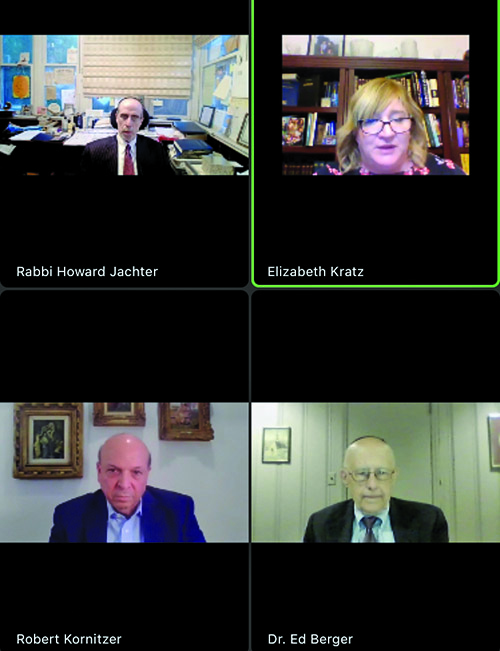

It could be the wind-up to a classic joke: What do you get when you bring together a prominent congregational rabbi and Jewish educator, a veteran psychologist, a seasoned family law attorney, and a skilled journalist/moderator, coming together on the Zoom platform on a weekday afternoon during a tropical storm?
What viewers got from this mix on Tuesday, August 4, was a thought-provoking dialogue on the issues and challenges that face both the couples in Jewish marriages and the practitioners who support them. Because the Zoom event took place as Tropical Store Isaias was making landfall in New Jersey, there was the added drama of occasional disappearing and reappearing panelists, due to technical difficulties from the storm.
The online dialogue, sponsored by Kornitzer Family Law, LLC, and The Jewish Link, brought together three well-regarded professionals:
Rabbi Haim Jachter, spiritual leader of Sha’arei Orah, the Sephardic Congregation of Teaneck, a Jewish Link columnist, and a 30-year member of the Beit Din of Elizabeth;
Dr. Edward Berger, a psychologist with decades of experience who has counseled hundreds of individuals and couples;
Robert Kornitzer, of the law firm of Kornitzer Family Law, who has over two decades of family law experience.
Elizabeth Kratz, the associate publisher/editor of The Jewish Link, served as moderator, and led the three professionals in a spirited and informative dialogue on a number of contemporary issues in Jewish marriage.
Responding to the question “How has COVID-19 changed your relationships with clients?” Rabbi Jachter said that “it’s essential to be flexible; you must be nimble” to use the different technologies available. Those who can manage these tools find that their communications with clients are actually improved at this time. Dr. Berger said that while the ideal is in-person contact, he sees that teletherapy is here to stay and it has benefits: it removes geographical boundaries, eliminates commutes, and adds convenience. Kornitzer also prefers in-person contact but sees clear benefits to clients with virtual options: they are more convenient and save clients time and money.
Asked how they balance contrasting secular and halachic imperatives, Berger responded that he makes clients aware of different issues (on both sides) that can present concerns but, as a therapist, he never tries to push a client in a specific direction. Kornitzer noted that the differing imperatives add complexity to any legal negotiation or court situation and pointed out that secular judges may not be best suited to adjudicate between people with different hashkafic needs. Rabbi Jachter said that despite the challenges, frum Jews are called to have a foot in both worlds: as Avraham Avinu said: “Ger v’toshav imachem” (“I am a stranger and a settler among you,” Bereshit 23:4).
Asked, “How hard do you encourage couples to stay together?” Kornitzer said that when he meets with a client he tries to assess “Do they know what they’re doing? Is this a spur-of-the-moment thing?” He also asks if they’ve been in counseling at some point in the marriage. He said that if he determines that the potential client has not thought through the ramifications, he will not take the case. Rabbi Jachter said that there is a bias in Jewish tradition to try to avoid divorce, citing the adage in the Gemara (Gittin 90b and Sanhedrin 22a) that when a man divorces his wife, “the altar cries.” Rabbi Jachter will encourage couples to consider: Is a potential divorce in the best interest of the children? Is the process fair? Is the bet din a proper one? Berger remarked that he often views his role as helping the client see the value of keeping the marriage together. And he recognizes that even in a dysfunctional marriage there is still a value to the children of living within a nuclear family.
Responding to a question of the value of a halachic prenuptial agreement, Rabbi Jachter said he will not perform a wedding without one. Berger asserted that they are “an excellent idea” because “they help people see the real-life concerns and challenges of marriage.” Kornitzer advised that while they are well intended, at times prenuptial agreements can add difficulties in the divorce process and often they are not enforceable in secular courts.
Considering a question about agunot, Kornitzer said that he will not represent a man who withholds a get from his spouse, saying it’s a “great chilul Hashem” and it “plays very badly in the secular courts.” Berger said that the challenge is that the person denying the get does not think they are acting in bad faith or creating a chilul Hashem; they think they have some overriding justification. Rabbi Jachter remarked that in his experience, prenuptial agreements almost always deter the agunah situation; as he has heard, there was only one such case among people using the RCA prenuptial agreement in the nearly 30 years it has been offered.
Asked about the usefulness of mediation, Berger said that in his experience, “lawyers can become like professional gunslingers, looking out only for the best interest of their clients,” while mediation looks for a win/win situation. Rabbi Jachter commented that not every couple may be good candidates for mediation, but for those who are suited to it, and use a trained mediator, mediation can offer better options and better results for the children. Kornitzer said that he has seen a range of outcomes with mediation, with some results not so good, and that it is a mistake for someone to go to mediation without knowing their rights under the law. He remarked: “It is not one size fits all.”
Despite the contrasting views and vantage points, the dialogue was remarkably constructive and informative. As one measure of how well the conversation went, Berger suggested to the other two professionals at the end of the event that they might consider writing a book together on the topic. From what viewers saw in the dialogue, there’s certainly a lot of material they can address together.
By Harry Glazer
�













